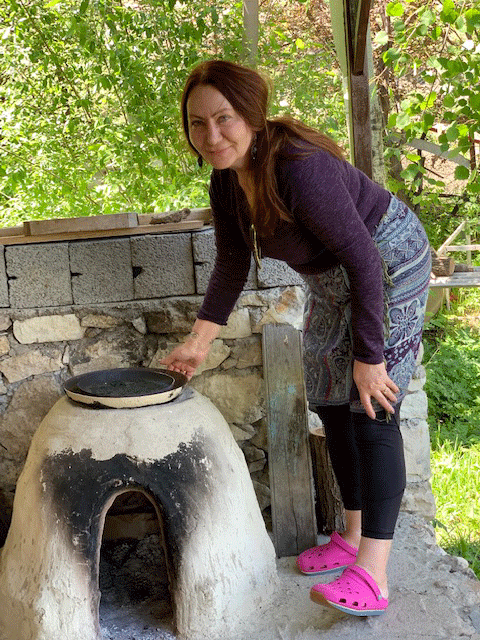
Irina Kostina, associate professor of instruction
What UI associate professor of instruction Irina Kostina remembers most about her childhood growing up in Dagestan, a republic in the North Caucasus, were the al fresco dinners shared among neighbors. Families would set out large tables to dine and converse while the children entertained the adults with song and dance.
She recently had the chance to return after many years this past summer - the war with Chechnya having kept her away. Her goal - to conduct research on life there now and to share these insights with UI students in Spring 2020 when she teaches a new course, “The North Caucasus as a Crossroad of Civilization,” funded in part by the UI International Programs (IP) Global Curriculum Development Award.
The Global Curriculum Development Award is given to faculty creating a new undergraduate course, or substantially revising an existing course, in order to integrate international or global perspectives into an undergraduate major.
“I am very appreciative of receiving this award from International Programs, and also for the support provided to me by IP's director of academic programs, Kelly Kadera,” Kostina says.
Kostina’s course, which will be required for Russian majors and Russian and East European Studies minors, is designed to show past and present global issues, not only in Dagestan, but in the entire North Caucasus region. It will cover threats to peace, such as terrorism and the export of the North Caucasus jihad, and women’s rights violations. Kostina not only wants students to come away with an understanding of these issues, but also to propose solutions.
"The North Caucus is an important region connected to some of the most significant geopolitical movements of our time. This new course will provide students with an in-depth understanding of a part of the world that is often overlooked," says Downing Thomas, associate provost and dean of International Programs.
Students will have the opportunity to watch video recordings of discussions Kostina had with Caucasians as part of her research; they will also engage with some of them through WhatsApp and Skype so that they can discuss the challenges and opportunities face-to-face.
“It is important for students to get a holistic view of Russia to understand not only its central European territory, but the provincial Asian regions,” says Kostina.
Dagestan, like many of the republics that make up the North Caucasus, is a mountainous region that borders the Caspian Sea. It is comprised of multiple ethnicities, having been dominated by various peoples throughout history. It came under heavy Russian influence in the eighteenth century and by the time the Soviet Union fell, Islamic insurgents from Chechnya developed a foothold. This led to frequent clashes between the Russians and the militants over the years. While more than 30 languages survive, Russian is the lingua franca of Dagestan.
“Dagestan has so many languages that one village couldn’t understand another,” says Kostina. “In order to survive they needed the Russian language. It united them. When I grew up nobody even asked what your nationality was. Each nationality had its own theatre, its own radio station, so they kept these languages alive.”
Kostina’s family history reflects this diversity. Her ancestors came from Poland, Georgia, Armenia, and Ukraine. Each has a unique story for how they arrived in Dagestan. Her maternal grandfather, for example, originally from Ukraine, studied medicine in Vienna and subsequently served as a surgeon helping wounded Austrians during WWI. Deemed an Austrian spy by the Russians, he was exiled to Siberia and later to Dagestan. Many of her family members left Dagestan in the 1990s due to the war with Chechnya.
Because of the region’s tumultuous history, Kostina was apprehensive of what she would find, but the results of her research surprised her.
“After visiting Dagestan I understood that there is hope,” she says. “We can be friends and we should be friends. Everybody is interested in the United States. They dream about friendly relations between the two countries.” She adds, “Caucasian hospitality is such that they say: bring people here to show how we are.”